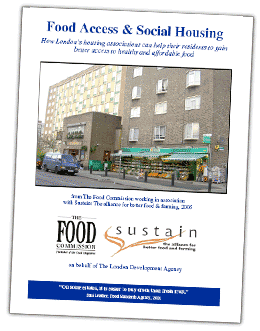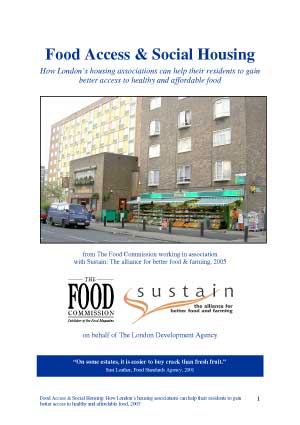Food Access & Social Housing: How to help residents gain access to good food
 Written to contribute to the development of the Mayor's London Food Strategy, this report draws on the experiences of housing associations and other social landlords in helping their residents gain better access to good food, food skills, and opportunities to grow their own fruit and vegetables.
Written to contribute to the development of the Mayor's London Food Strategy, this report draws on the experiences of housing associations and other social landlords in helping their residents gain better access to good food, food skills, and opportunities to grow their own fruit and vegetables.
In a city as wealthy as London, residents have a right to a clean, comfortable and neighbourly place to live and a safe, health-enhancing and tasty diet.
To this end, the London Development Agency's food programme (which has now moved to the Greater London Authority) commissioned guidelines useful to, for instance, planners, housing associations, local authority staff, PCTs and local food and health organisations. The Food Access & Social Housing document offers guidance for housing associations working in London boroughs, showing how they can help people on a low income to gain access to healthy and affordable food.
This guidance document explores how community food initiatives can be integrated with programmes for regeneration, community development and resident involvement, to help housing associations build social capital and improve the health of their residents. It also signals how such work can contribute to other strategic priorities relating to, for instance, Corporate Social Responsibility, neighbourhood renewal and building sustainable communities.
The document is mainly for large housing associations working with diverse communities in London, who have adequate staff and funding to enable them to participate in regeneration initiatives, community engagement and policy development. However, some of the initiatives and ideas may be useful to smaller housing associations, especially where these provide opportunities to work in partnership with other housing groups and with community organisations.
Progress update: Since publication of this report, Sustain has worked with local authorities, community support workers and social landlords to, for example, set up food co-ops and establish community food growing spaces for the benefit of local people, particularly those living on a low income. See:
-- The Food Co-ops Toolkit, www.foodcoops.org
-- Capital Growth, the campaign to support 2,012 new community food growing spaces for London by the end of 2012, www.capitalgrowth.org
Report contents
Introduction
Section 1: The case for action
Section 1: The case for action
Section 2: Adopting a strategic approach
- Availability
- Affordability
- Awareness
- Acceptability
- The value of community participation
- Being aware of potential pitfalls
Section 3: Integrating food into housing association business strategies
Conclusion
Recommendations
Appendices
-
Appendix 1: Case studies – Contact details for all the case studies?
- CASE STUDY A: Walthamstow
- CASE STUDY B: Hackney
- CASE STUDY C: Shepherd’s Bush
- CASE STUDY D: Tower Hamlets
- Appendix 2: Useful sources of information
- Appendix 3: Acknowledgementss

Food Access & Social Housing: How to help residents gain access to good food
34pp - 2004 | 1840Kb
Published Monday 1 March 2004
London Food Link: London Food Link brings together community food enterprises and projects that are working to make good food accessible to everyone in London to help create a healthy, sustainable and ethical food system for all.